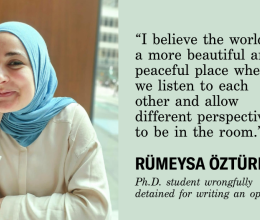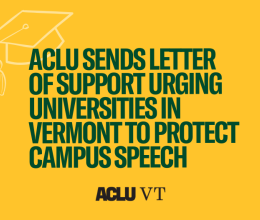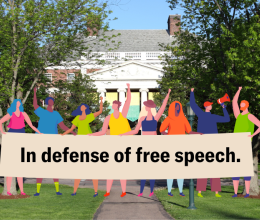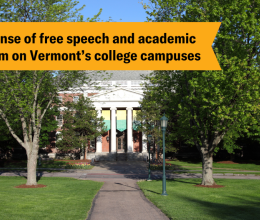This letter was originally published in the Burlington Free Press on March 16th, 2018.
In December, the city of Burlington settled a lawsuit brought by the ACLU to end the city’s practice of pressuring landlords to evict tenants who call for police help “too frequently” (“Burlington to pay $30K in eviction case,” Dec. 19)
The settlement included a $30,000 payment to the plaintiff, Joseph Montagno, and a pledge from the city to revise its ordinances to provide meaningful due process protections for tenants and stop encouraging evictions.
Unfortunately, with the ink barely dry on the settlement agreement, the city is backtracking with a proposed ordinance that effectively doubles down on the harmful practices at the heart of Mr. Montagno’s lawsuit. Now, instead of targeting “nuisance” tenants, the proposed ordinance would allow for the eviction of residents for an undefined list of offenses against the “right to quiet enjoyment of property.”
The city’s new proposal does not meet basic due process standards or protect the rights of vulnerable tenants.
The ACLU has challenged local policies like Burlington’s nationwide. We have seen that those targeted by municipalities are overwhelmingly survivors of domestic violence, people of color, low-income families, people in mental health crisis, and tenants looking for help after a drug overdose, and we know that these policies dissuade people from calling for help when they need it.
Here’s one example of how things could play out under the revised ordinance:
A victim of domestic violence calls the police for help on multiple occasions. Her boyfriend is arrested and found guilty of assault. Based on that conviction, the city notifies the landlord that “remedial action” is necessary. The boyfriend is evicted, and since the lease was in his name, the victim is left homeless.
Or take another example:
A tenant experiences a mental health crisis and his sister calls the police. The tenant is arrested and pleads guilty to a misdemeanor disorderly conduct to avoid jail time. The city notifies his landlord that “remedial action” is necessary. The landlord informs the tenant that he will be evicted if it happens again. When the tenant again needs help six months later, he and his sister are both afraid to ask for it.
Neither of these outcomes makes Burlington a safer or better place to live – to the contrary, they continue a pattern of the city punishing the people who can least afford it. The city’s proposed ordinance is simply new window dressing on an unlawful policy already challenged in court.
In a Jan. 26 letter, the ACLU urged Mayor Weinberger not to submit the proposal to the City Council and to return to the table for further discussion. Citing federal guidance and academic research, we expressed concern that the ordinances as revised will continue to violate the rights of landlords and tenants alike, incentivize unnecessary arrests, and compound Burlington’s homelessness, mental health, and addiction crises.
We never received a response.
The mayor’s office seems intent on perpetuating these damaging policies, but Burlington’s residents don’t have to accept that, nor should they. The ACLU is calling on Burlington’s City Council to reject the revised ordinance and demand a new version that honors the settlement agreement the city just signed by providing due process for landlords and tenants, and better protecting vulnerable populations from eviction. Until the city’s officials change course, the ACLU will keep fighting to defend the civil and constitutional rights of all its residents.




